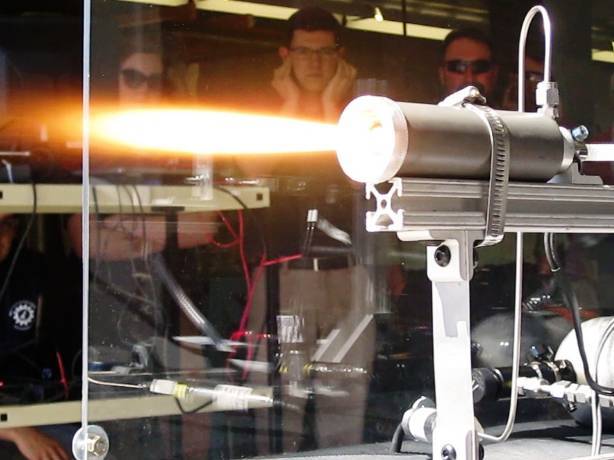Green Rockets
In response to a governmental need for a stable “green” alternative to the popular propellant hydrazine, Utah State University researchers developed a hybrid rocket motor using fused deposition modeling.
Problem
Toxicity and the risk of explosion contribute to the high cost of producing, operating and transporting propellants currently used for small satellite guidance in space. Developing a non-toxic, stable, “green” alternative for hydrazine, the most commonly used in-space propellant, is a highly sought-after solution for governmental agencies.
While hybrid rocket motors are a solution due to their well-known safety and handling advantages, hybrid rocket motors aren’t widely used because they produce unacceptably high oxidizer-to-fuel ratios, which erodes fuel grains and nozzles. They are also difficult to restart, making pyrotechnics a necessity.
Solution
Researchers at Utah State developed a hybrid rocket motor using fused deposition modeling, a type of 3D additive manufacturing. In this process, the solid grain of the hybrid motor is created by successive plastic layers that can be 3D printed into ports of almost any shape, including one with a helical bore that reduces oxidizer-to-fuel ratios, modifies burn properties and increases overall combustion efficiency. The motor can also be stopped and restarted using arc ignition processes rather than pyrotechnics.
Benefits
In the manufacture of non-toxic rocket motors, workers no longer need to wear hazmat suits. In use, the green rocket developed at Utah State improves combustion and oxidizer-to-fuel ratios while potentially reducing operating costs.
Applications
Utah State’s green rocket can be used for small satellites owned by both governmental and commercial entities.

Contact
Questions about this technology including licensing availability can be directed to:
Alan Edwards, MA, JD
Manager, Technology Transfer Services
(435) 797-2328 alan.edwards@usu.edu
Inteum IDs:
C13016
C14035
C15002
Development Stage
TRL 3
Conception, proof of concept, modeling, prototypes
Patent Status
Patents granted and applied for.

